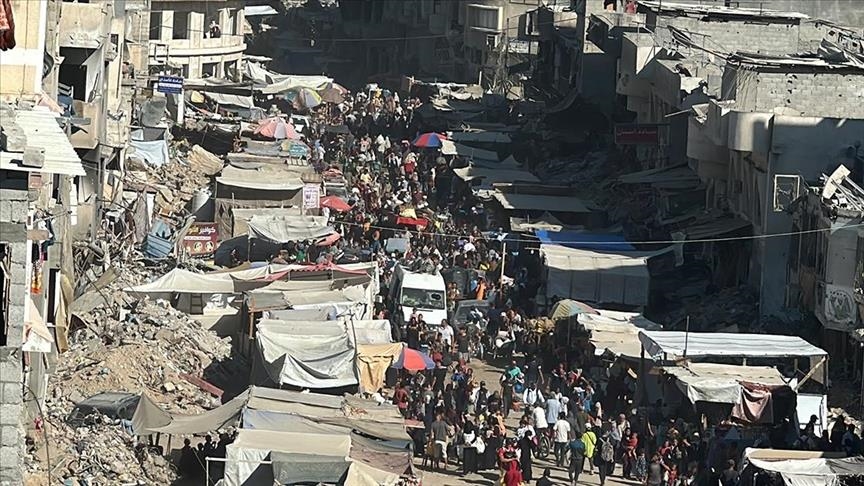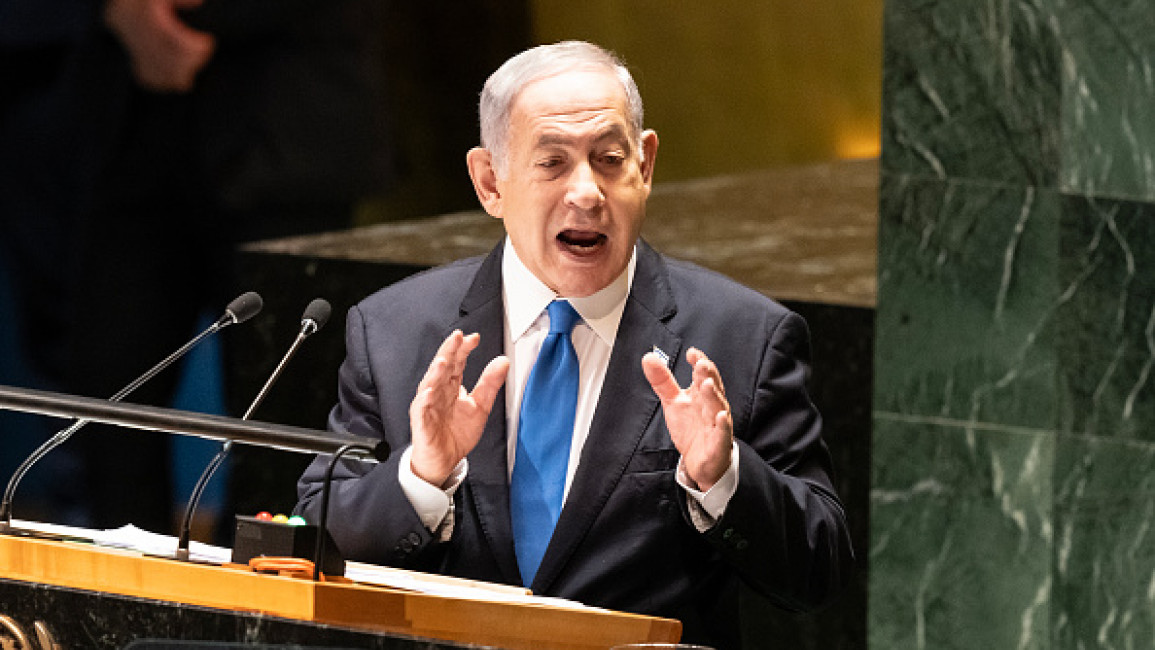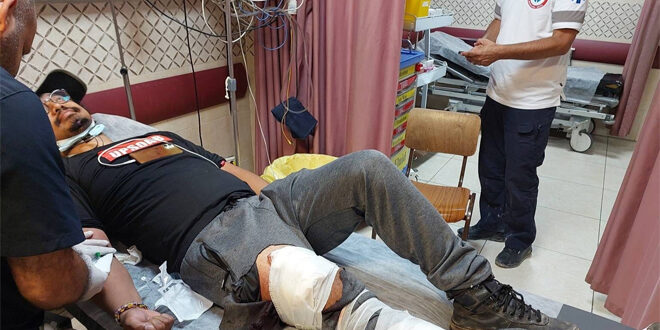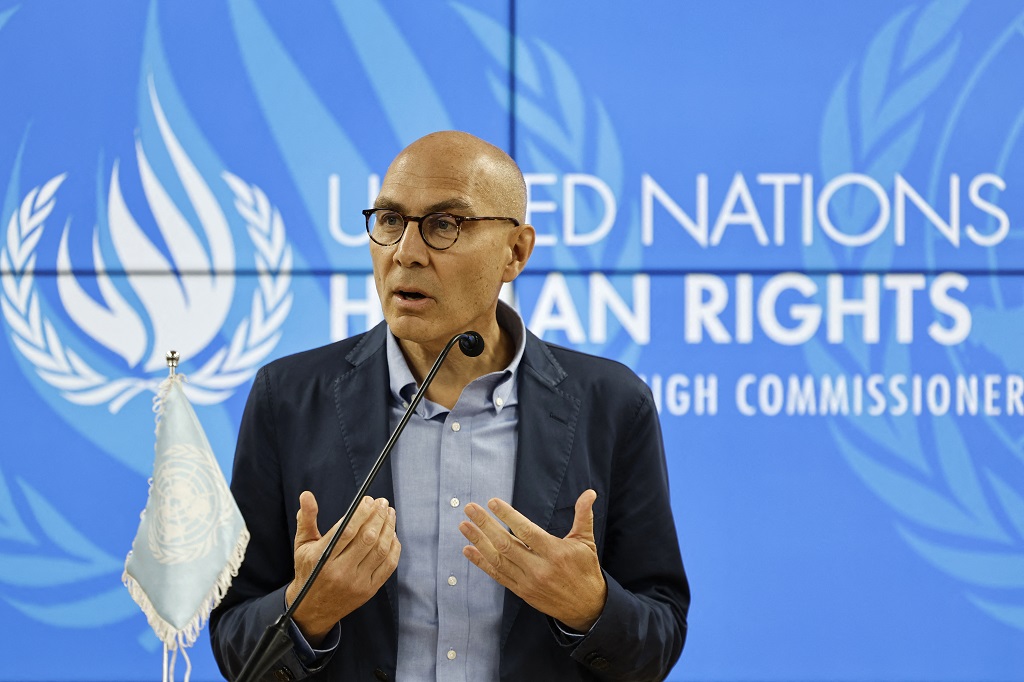An Israeli strike on a school-turned-shelter in Gaza City has been condemned by Hamas as a ‘dangerous escalation’.

Published On 10 Aug 2024
An Israeli strike on a school-turned-shelter for displaced Palestinians in Gaza City has killed more than 100 people including women and children, according to Palestinian officials, who expect the death toll to rise.
The Israeli army on Saturday claimed its air forces struck a “command and control centre” that “served as a hideout for Hamas terrorists and commanders” at the al-Tabin school. It did not provide evidence and said it had taken steps to reduce the risk of harming civilians, while dismissing the death toll from Palestinian officials as inaccurate.
Here are some reactions to the attack:
Hamas
“The massacre at al-Tabin school in the Daraj neighbourhood in central Gaza City is a horrific crime that constitutes a dangerous escalation,” said the movement that governs the Gaza Strip.
Izzat al-Rishq, a member of the Palestinian group’s political bureau, said there were no armed men at the school.
Hamas said in its statement that Israel’s claims of the school being used as the group’s command centre are “excuses to target civilians, schools, hospitals, and refugee tents, all of which are false pretexts and exposed lies to justify its crimes”.
“We call on our Arab and Islamic countries and the international community to fulfill their responsibilities and take urgent action to stop these massacres and halt the escalating Zionist aggression against our people and defenseless citizens,” the statement ends.
Ismail al-Thawabta, the director general of Gaza’s Government Media Office, called on the international community and United Nations Security Council “to pressure Israel to end this cascading bloodbath among our people, namely innocent women and children”.
Fatah
Fatah, the rival Palestinian faction that last month signed a “national unity” agreement with Hamas, said the attack was a “heinous bloody massacre” that represents the “peak of terrorism and criminality”.
“Committing these massacres confirms beyond a shadow of a doubt its efforts to exterminate our people through the policy of cumulative killing and mass massacres that make living consciences tremble,” it said in a statement.
Ali Shamkhani, secretary of the Supreme National Security Council of Iran, said the Israeli government’s goal was to thwart ceasefire negotiations and continue the war.
Ministry of Foreign Affairs spokesman Nasser Kanaani said Israel had again shown that it wasn’t committed to international law, as he condemned the attack as genocide and a war crime.
He urged immediate action from the UN Security Council and said Israel’s actions in Gaza were a threat to international peace and security.
Qatar
Qatar’s foreign ministry has condemned the attack saying it constitutes a “horrific massacre and a brutal crime against defenceless civilians.”
It called again for a UN independent fact-finding mission to investigate attacks on centres sheltering displaced Palestinians in Gaza and demanded that the international community oblige Israel to uphold international law and ensure their protection.
Egypt
The Ministry of Foreign Affairs said that Israel’s “deliberate killing” of unarmed Palestinians shows that it lacks the political will to end the war in Gaza.
It accused Israel of repeatedly committing “large-scale crimes” against “unarmed civilians” whenever there is an international push for a ceasefire, in a statement cited by the state-run Middle East News Agency.
It said such attacks reflect “an unprecedented disregard” for international law.
Egypt, the United States and Qatar have called for a new round of ceasefire negotiations for Thursday, as fears grow of a broader conflict, involving Iran and its Lebanese ally Hezbollah.
Jordan
Israel’s attack goes against “all humanitarian values” and is “an indication of the Israeli government’s attempt to block [peace] efforts and postpone them”, the Ministry of Foreign Affairs said.
It added that “the absence of a decisive international stance to restrain Israeli aggression and compel it to respect international law and stop its aggression against Gaza” was resulting in unprecedented killings, deaths and human catastrophe”.
Saudi Arabia
The Ministry of Foreign Affairs said it denounced the attack in the “strongest terms” and stressed that “mass massacres” in the enclave “need to stop”.
Gaza is “experiencing an unprecedented humanitarian catastrophe due to the ongoing violations of international law”, the ministry said.
Organisation of Islamic Cooperation
The strike was “an extension of the brutal massacres and genocide committed by the Israeli occupation for more than ten months in the Gaza Strip”, the OIC said.
It called on the international community, especially the UN Security Council, to oblige Israel to respect its obligations as occupying power under international law and provide protection to the Palestinian people.
UN rapporteur
Francesca Albanese, the United Nations’s special rapporteur on the occupied Palestinian territories, condemned the world’s “indifference” to mass bloodshed in Gaza following the attack.
“Israel is genociding the Palestinians one neighborhood at the time, one hospital at the time, one school at the time, one refugee camp at the time, one ‘safe zone’ at the time. With US and European weapons,” Albanese posted on X.
“May the Palestinians forgive us for our collective inability to protect them, honouring the most basic meaning of international law.”
Save the Children
Tamer Kirolos, a regional director for the United Kingdom-based charity, called it the “deadliest attack on a school since last October”.
“It is devastating to see the toll this has taken, including so many children and people at the school for dawn prayers,” Kirolos said, adding that “children make up around 40 percent of the population and of people killed and injured since October” in the enclave.
“Civilians, children, must be protected. An immediate definitive ceasefire is the only foreseeable way that will happen.”
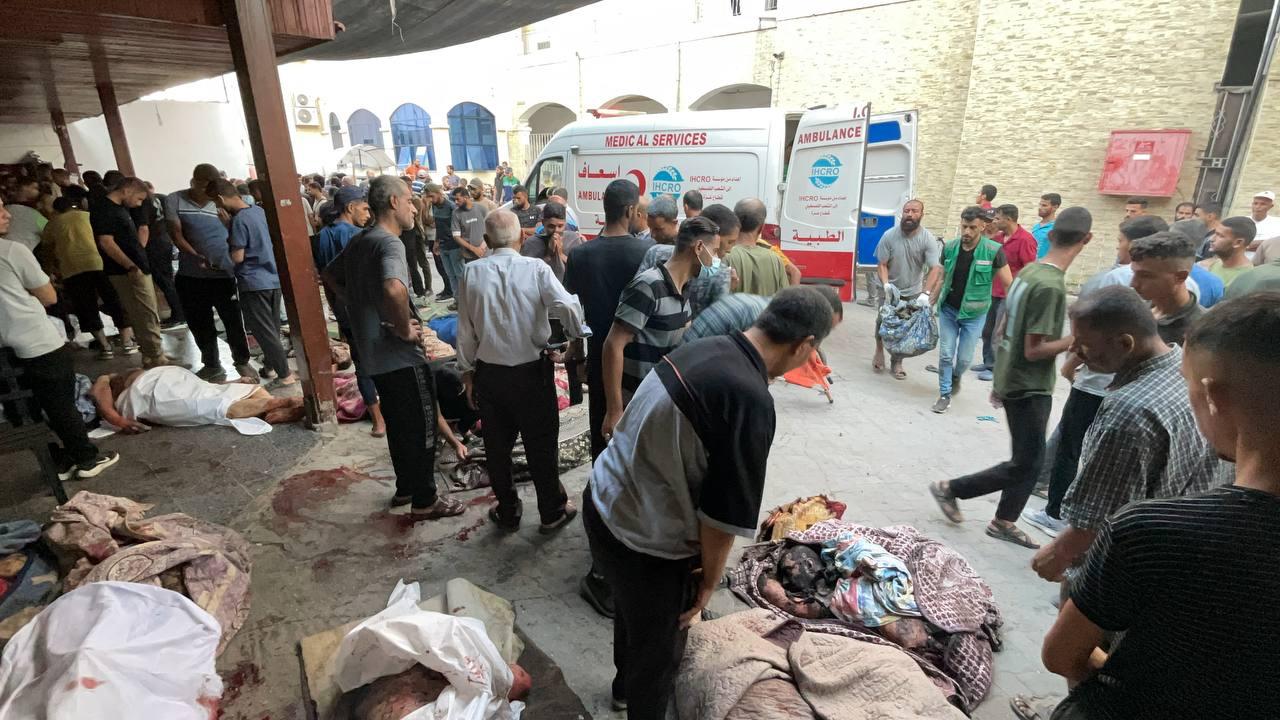
2024-08-10
Shafaq News/ On Saturday, Hamas condemned an Israeli airstrike on the Al-Tabe'een school in Gaza City, which killed over 100 people and injured dozens more. The group accused Israel of committing "genocide and ethnic cleansing" against Palestinians.
In a statement, the Palestinian military group said that such actions were made possible by US support, urging Arab and Islamic nations, as well as the international community, to take immediate action to stop what it called a "horrific crime and dangerous escalation."
"This (attack) is clearly part of the genocide and ethnic cleansing against our Palestinian people," Hamas said.
The airstrike targeted the school, located in the Al-Daraj neighborhood of eastern Gaza City, where displaced civilians had taken shelter. According to the Palestinian news agency WAFA, rescue teams are still working to recover bodies and survivors from the rubble.
The Israeli military acknowledged the strike, claiming it was aimed at Hamas militants using the school as a command and control center. Hamas has consistently denied operating among civilians.
This attack is part of a broader escalation in Gaza, where Israel has struck six schools in the past week, leading to the deaths of hundreds, primarily women and children. Since the conflict escalated on October 7, the death toll in Gaza has reached 39,699, with the majority being children and women. An additional 91,722 people have been injured, though the numbers are expected to rise as many victims remain trapped under debris, with rescue efforts ongoing.
Over 100 killed when Israeli army targeted school where displaced Palestinians performed fajr (dawn) prayer
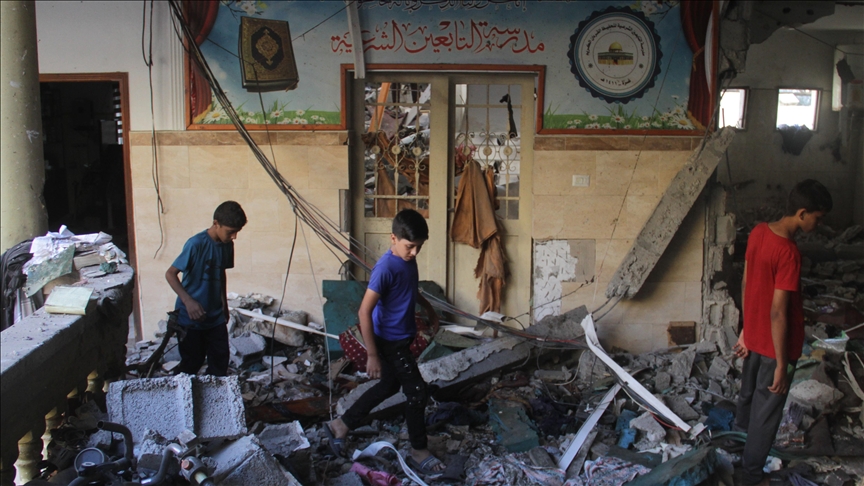
GAZA CITY, Palestine
Palestinian factions strongly condemned on Saturday the "horrific massacre" perpetrated by the Israeli army against displaced Palestinians seeking refuge at the Al-Taba'een school in the Al-Daraj neighborhood, central Gaza.
The attack, which targeted civilian worshipers performing fajr (dawn) prayers, killed over 100 Palestinians and injured several others.
The Islamic Jihad movement labeled the attack as a "full-fledged war crime," and said: "choosing the timing of the dawn prayer to carry out this horrific and terrible massacre confirms that the enemy had the intention to cause the largest possible number of martyrs among civilians, including children and the elderly."
The Palestinian group Hamas also issued a statement condemning the “massacre,” calling it "a severe crime against humanity.”
The movement highlighted that this incident is part of a “broader pattern of violence, including previous attacks on hospitals and residential buildings.”
Fatah spokesperson Munther Al-Hayek said the attack is "a heinous crime against displaced civilians" and called on the international community to intervene immediately.
“The blood of children cries out to the global conscience to stop the genocide being committed by Israel in Gaza,” Hayek stated.
The Democratic Front for the Liberation of Palestine (DFLP) also condemned the “massacre,” arguing that “such crimes could only be committed by Israel due to the political and military backing” it receives from the US and the "deafening silence" of the international community.
Witnesses reported that three missiles targeted the prayer area turning it into a scene of carnage, with charred bodies and scattered remains.
With the bombing of Al-Taba'een school, the total number of schools targeted by the Israeli army in Gaza City over the past week has increased to six, according to an Anadolu tally.
Despite appeals on Thursday from mediators, including Egypt, the US, and Qatar, to stop hostilities, reach a cease-fire, and a hostage exchange agreement, Israel persists with its deadly offensive on the Gaza Strip.
The Israeli onslaught against the Gaza Strip has killed nearly 39,700 people since last October following a cross-border attack by the Palestinian resistance group Hamas.
Israel is accused of genocide at the International Court of Justice (ICJ), which ordered it to immediately halt its military operation in the southern city of Rafah, where more than 1 million Palestinians had sought refuge from the war before it was invaded on May 6.
• Writing by Ikram Kouachi
10 August 2024 -
Palestinians inspect the site of Israeli strikes on a school sheltering displaced people, amid Israel-Hamas conflict, in Gaza City, August 3, 2024. REUTERS/Mahmoud Issa
Image: Mahmoud Issa
More than 100 Palestinians were killed and dozens wounded in an Israeli strike on a Gaza school sheltering displaced people, the Hamas-run Gaza government said on Saturday, an air strike the Israeli military said had targeted a Hamas command centre.
The strikes hit when people sheltering at the school were performing dawn prayers, leading to many casualties, the Hamas media office said in a statement. Medics had not yet been able t reach all the bodies, it said.
There was no immediate information from Gaza health authorities.
The Israeli military said in a statement that its air force targeted a command and control centre where Hamas commanders and operatives were hiding.
The military said it had taken steps to reduce the risk of harming civilians, “including the use of precise munitions, aerial surveillance, and intelligence information”. It did not immediately comment on the casualty reports from Gaza.
Israel launched its assault on Gaza, aiming to wipe out Hamas after the Islamist group's fighters stormed into southern Israel on October 7, killing 1,200 people, mostly civilians, and capturing more than 250 hostages according to Israeli tallies.
Since then, nearly 40,000 Palestinians have been killed in the Israeli offensive in Gaza, according to the Palestinian health ministry, which does not distinguish between combatants and civilians.
Health officials say most of the fatalities have been civilian. Israel, which has lost 329 in Gaza, says at least a third of the Palestinian fatalities are fighters.
The US, Egypt and Qatar are trying to revive Gaza ceasefire talks, scheduling a new round of negotiations for Thursday, as fears are growing of a broader conflict, involving Iran and its Lebanese ally Hezbollah. Tehran also backs Hamas.
Over 100 killed on early Saturday when Israeli army targeted school where displaced Palestinians were performing fajr (dawn) prayer
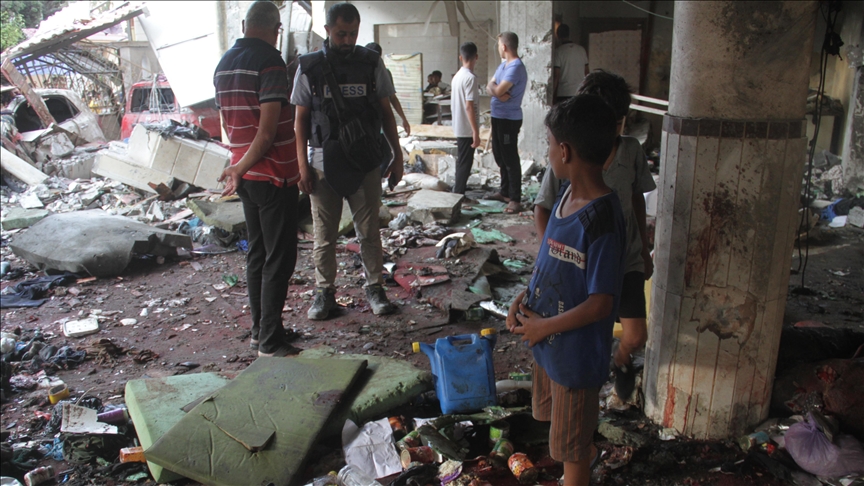
ANKARA
Israel has conducted airstrikes on 13 shelter centers in Gaza, where displaced Palestinians have been seeking refuge, since the beginning of August, the Civil Defense spokesman in the besieged Palestinian enclave said on Saturday.
The latest attack came on early Saturday as Israeli military bombed the Al-Taba'een school in the Al-Daraj neighborhood in eastern Gaza City, killing at least 100 Palestinians.
In a news conference, Mahmoud Basal, the Civil Defense spokesman in Gaza, said the Israeli attack on the Al-Taba’een school hit two floors – A floor housing women and another floor that served as a prayer room for displaced civilians.
The latest strike has resulted in numerous casualties, with many people still unaccounted for, he added.
“We demand the world to intervene immediately to stop the massacres against defenseless civilians in shelters,” Basal said.
Earlier, the Government Media Office in the Gaza Strip said: “The Israeli army directly targeted displaced civilians while performing fajr (dawn) prayers, (which) led to a rapid rise in the number of casualties.”
Despite appeals on Thursday from mediators, including Egypt, the US, and Qatar, to stop hostilities, reach a cease-fire, and a hostage exchange agreement, Israel persists with its deadly offensive on the Gaza Strip.
The Israeli onslaught against the Gaza Strip has killed nearly 39,700 people since last October following a cross-border attack by the Palestinian resistance group Hamas.
Israel is accused of genocide at the International Court of Justice (ICJ), which ordered it to immediately halt its military operation in the southern city of Rafah, where more than 1 million Palestinians had sought refuge from the war before it was invaded on May 6.
* Writing by Ikram Kouachi
